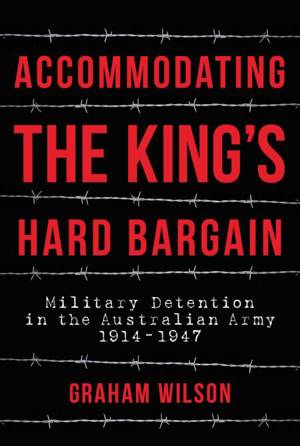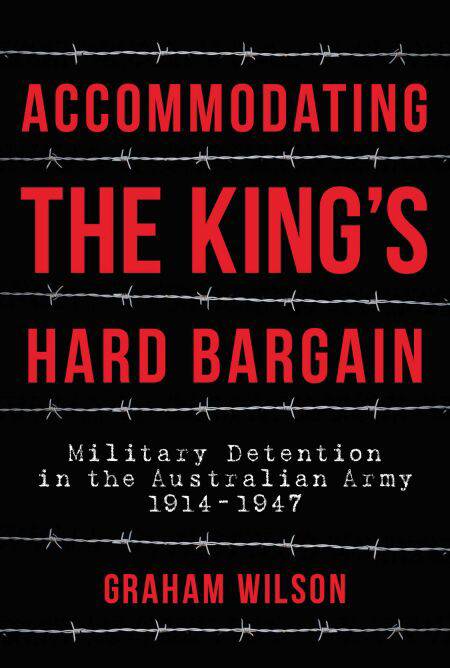
- Afhalen na 1 uur in een winkel met voorraad
- Gratis thuislevering in België vanaf € 30
- Ruim aanbod met 7 miljoen producten
- Afhalen na 1 uur in een winkel met voorraad
- Gratis thuislevering in België vanaf € 30
- Ruim aanbod met 7 miljoen producten
Zoeken
Accommodating the King's Hard Bargain E-BOOK
Military Detention in the Australian Army 1914-1947
Graham Wilson
E-book | Engels
€ 6,76
+ 6 punten
Omschrijving
Like all crime and punishment, military detention in the Australian Army has a long and fraught history. Accommodating The King’s Hard Bargain tells the gritty story of military detention and punishment dating from colonial times with a focus on the system rather than the individual soldier. World War I was Australia’s first experience of a mass army and the detention experience was complex, encompassing short and long-term detention, from punishment in the field to incarceration in British and Australian military detention facilities.
The World War II experience was similarly complex, with detention facilities in England, Palestine and Malaya, mainland Australia and New Guinea. Eventually the management of army detention would become the purview of an independent, specialist service.
With the end of the war, the army reconsidered detention and, based on lessons learned, established a single ‘corrective establishment’, its emphasis on rehabilitation. As Accommodating The King’s Hard Bargain graphically illustrates, the road from colonial experience to today’s tri-service corrective establishment was long and rocky. Armies are powerful instruments, but also fragile entities, their capability resting on discipline. It is in pursuit of this war-winning intangible that detention facilities are considered necessary — a necessity that continues in the modern army.
The World War II experience was similarly complex, with detention facilities in England, Palestine and Malaya, mainland Australia and New Guinea. Eventually the management of army detention would become the purview of an independent, specialist service.
With the end of the war, the army reconsidered detention and, based on lessons learned, established a single ‘corrective establishment’, its emphasis on rehabilitation. As Accommodating The King’s Hard Bargain graphically illustrates, the road from colonial experience to today’s tri-service corrective establishment was long and rocky. Armies are powerful instruments, but also fragile entities, their capability resting on discipline. It is in pursuit of this war-winning intangible that detention facilities are considered necessary — a necessity that continues in the modern army.
Specificaties
Betrokkenen
- Auteur(s):
- Uitgeverij:
Inhoud
- Aantal bladzijden:
- 496
- Taal:
- Engels
Eigenschappen
- Productcode (EAN):
- 9781925275926
- Verschijningsdatum:
- 4/02/2016
- Uitvoering:
- E-book
- Beveiligd met:
- Adobe DRM
- Formaat:
- ePub

Alleen bij Standaard Boekhandel
+ 6 punten op je klantenkaart van Standaard Boekhandel
Beoordelingen
We publiceren alleen reviews die voldoen aan de voorwaarden voor reviews. Bekijk onze voorwaarden voor reviews.








